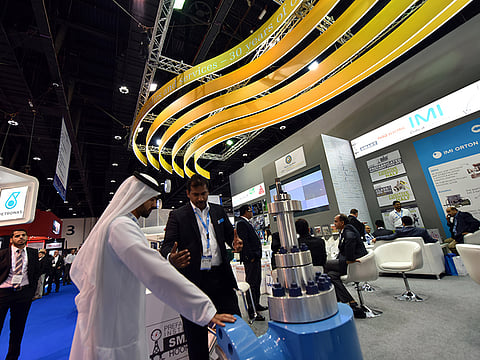Opec, non-Opec working to stabilise oil markets, energy minister says
The minister expresses optimism on the commitment of the group

Abu Dhabi: Organisation of the Petroleum Exporting Countries (Opec) and non-Opec members are working together to stabilise the oil market, the UAE energy minister Suhail Al Mazroui said in Abu Dhabi as Opec gets ready for an important meeting later this month in Vienna to decide on production cuts.
“Opec and others are working together. Everyone is keen to do their best for the benefits of their countries and for the whole industry,” said Al Mazroui while taking part in a discussion on Thriving In New Energy Landscape on the second day of Abu Dhabi International Petroleum Exhibition and Conference.
“I can assure that we are committed, we are concerned and even everyone who is a major producer even if they are not part of Opec have shown interest in this initiative. We are optimistic about the outcome.”
Opec agreed on September 28 in Algeria to reduce output to a range of 32.5 million to 33 million barrels a day and decide how much each member should cut by its next meeting on November 30 in Vienna.
The group also held meetings with Russia, Mexico, Kazakhstan, Brazil and Azerbaijan last month in an effort to bring non-Opec members on board for a possible deal on cutting or freezing production.
Al Mazroui also said that there is a meeting of a committee later this month which will come up with a recommendation on output quotas before the ministerial meeting on November 30.
When asked what has prompted Opec for a possible action to stabilise oil markets, the energy minister said the glut is almost gone and there is a need to help the oil market.
“One year ago, the shale oil production was a million higher than what it is today so it does not make sense to curtail at that time as market was overflooded. Now the glut is gone, we can talk about a freeze or cutting to allow the balance from this overstorage that happened all over the world.”
Speaking on the merger of International Petroleum Investment Company (Ipic) with Mubadala, he said the merger will enable Abu Dhabi create a champion not only in oil and gas sector but also in aluminium and semiconductor business.
“The rationale behind the merger is we want to be more focused and want to achieve synergies from whole spectrum of investments. There are obvious overlaps about the investments we have it in Ipic and investments in Mubadala. We will build a stronger and more resilient company.”
Meanwhile, Cepsa, the Spanish integrated energy major 100 per cent owned by Ipic, is considering a number of projects with its partners in Abu Dhabi and the Middle East as it seeks to enhance its business presence in the region, its CEO Pedro Miro said.
“We are working on several projects in the Middle East that will help us ensure Cepsa is well placed coming out of a sustained downturn,” Miro said at a press conference in Adipec.
Sign up for the Daily Briefing
Get the latest news and updates straight to your inbox


